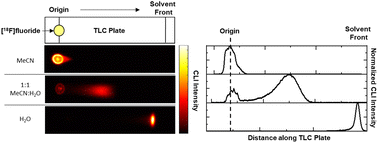Detrimental impact of aqueous mobile phases on 18F-labelled radiopharmaceutical analysis via radio-TLC†
Abstract
The list of new positron-emission tomography (PET) tracers has rapidly grown in the past decade, following discoveries of new biological targets and therapeutic strategies, with several compounds garnering recent regulatory approval for clinical use. During the development of synthesis methods and production of new tracers for imaging, analytical methods for radio-high performance liquid chromatography (radio-HPLC) and radio-thin layer chromatography (radio-TLC) separations need to be developed to assess radiochemical compositions. Radio-TLC is often faster, simpler, and sometimes more accurate than radio-HPLC (as there is no underestimation of [18F]fluoride when analyzing 18F-labeled radiopharmaceuticals). Many protocols have been developed for separating 18F-radiopharmaceuticals on silica TLC plates, typically with [18F]fluoride retained at the origin and the radiopharmaceutical (and impurities) migrating along the plate. Interestingly, many reports describe the use of aqueous conditions to mobilize polar species, but it is known that aqueous conditions can modify silica and alter its chromatographic behavior. In this technical note, we explore the effects that aqueous conditions have on the analysis of 18F-radiopharmaceutical mixtures, revealing that with sufficient water, the radionuclide ([18F]fluoride) can migrate away from the origin and can be split into multiple bands. Furthermore, water can hinder the migration of the radiopharmaceutical. These effects can lead to overlapped bands or reversal of the normally expected order of bands, potentially leading to the misinterpretation of results if care is not taken to validate the TLC method carefully.

- This article is part of the themed collection: Analytical Methods HOT Articles 2023


 Please wait while we load your content...
Please wait while we load your content...